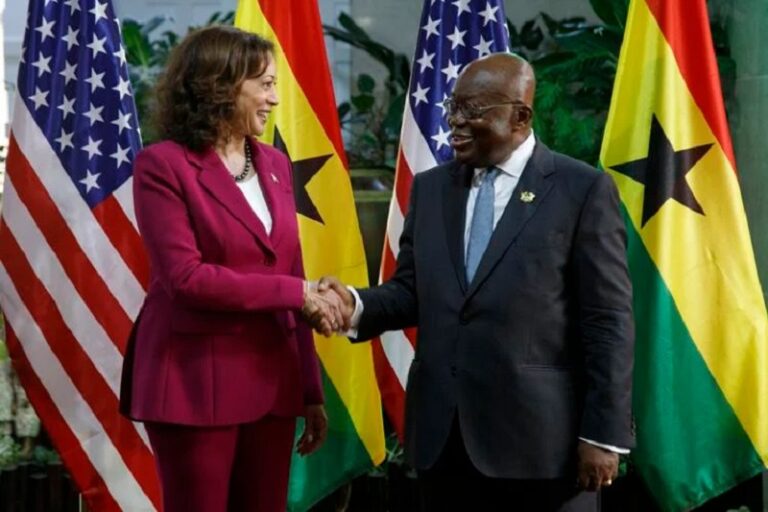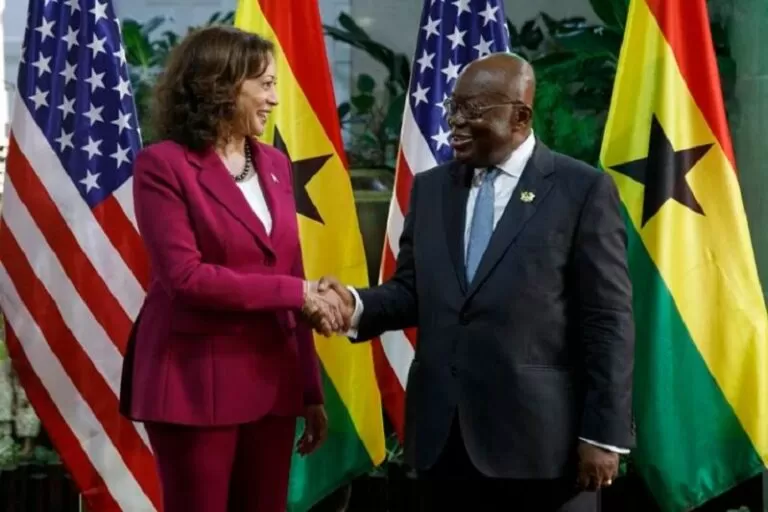

harris meets ghana's president and makes aid and investment commitments
During a meeting with Ghanaian President Nana Akufo-Addo on Monday, U.S. Vice President Kamala Harris praised Akufo-Addo for his “democratic principles.” Akufo-Addo is facing growing discontent over inflation and new worries about regional security. Harris made the remarks during a meeting with the leader. A concerted effort to broaden U.S. outreach at a time when China and Russia have established interests of their own in Africa is what Harris is doing right now as she begins a weeklong journey to the continent that will also take her to Tanzania and Zambia. The trip is part of a concerted effort that began just now.
On Monday, the vice president of the United States was invited into the presidential residence of Ghana, which is known as the Jubilee House. While she was there, she made a number of promises about the country’s security and about making more investments there. She also said that the US would give $100 million to the area. After their meeting, she told the president that “under your leadership, Ghana has been a shining example of democracy and a contributor to peace and security around the world.” Under your leadership, Ghana has been a “beacon of democracy” and “a contributor to global peace and security.”
Before the COVID-19 pandemic, Akufo-Addo supervised one of the world’s economies that was expanding at a rapid rate. But the cost of food and other necessities has been going through the roof, and the country is facing a debt crisis because it can’t meet its financial obligations. During his discussion with Harris, Akufo-Addo voiced his support for international cooperation among nations whose economies, like Ghana’s, are working to get “back on track.” He also said that he was worried about how private investors in the United States tend to ignore the country.
He expressed the hope that “we want to be able to change that dynamic.” He said that their meeting had been a “boost to the steady cooperation” between the two countries and that this cooperation had been strengthened as a result. Also, there have been more random fights in the north of Ghana, which borders the more unstable country of Burkina Faso as well as the Sahel, where local branches of al-Qaida and the Islamic State group have been operating. In recent years, the Sahel has become increasingly unstable.
Akufo-Addo called terrorism a “poison” that was spreading through all of West Africa and making the area less stable. “We’re spending a lot of sleepless nights trying to ensure that we’re protected here,” he said to the vice president as the two of them gathered in a conference room at the palace, with their delegations seated on opposite sides of a long table.
During a press conference that took place after their discussion, Akufo-Addo stated that he was worried about terrorist organizations but that he did not have any official confirmation that al-Qaida is active in the country. He also said that he was worried about the possibility that the Russian mercenary force known as “Wagner” would increase its presence in the area. According to Akufo-Addo, this fact “raises the very real possibility that once again our continent is going to become the playground for a great power conflict.”
Akufo-Addo put to rest any worries about China’s influence in the region by saying that his country had relationships with many countries, including the US, and that these relationships were different from each other. He stated that the relationship with the United States of America is one that has remained strong over the course of several decades.
Given the sharp partisan divide that exists when it comes to the federal budget, it may be hard for Harris to get congressional approval for some of the money she has promised to spend. Also, the US Department of the Treasury plans to send a consultant to Accra to help manage the country’s huge debt. Some of the goals of other programs are to stop children from working, improve weather forecasting, help local musicians, and stop disease outbreaks.
In order to help Ghana and other countries improve their defenses, the United States has already sent military personnel to train the armed forces of those countries. However, other nations have begun to rely on Wagner, a company that is not only present on the front lines of Russia’s conflict in Ukraine but also has a footprint in Africa.
Wagner has started operations in Mali, and the French soldiers who were there have been sent home. People are worried that Wagner will also be sent to Burkina Faso, which is another country where France has pulled out its military. Recently, Ghana accused the leaders of Burkina Faso, who took power in a coup last year, of already turning to Wagner for assistance, which Akufo-Addo described as something that would be “unsettling.”
Antony Blinken, who is the Secretary of State for the United States, recently went to Niger, which is close to both Mali and Burkina Faso, to make an announcement about giving more help to the area. “As a result of the association with Wagner, we’ve seen countries find themselves weaker, poorer, more insecure, and less independent,” he said.
Washington is concerned about Russia’s attempts to make inroads into Africa, in spite of the fact that China’s dominance in Africa has been the primary focus of U.S. foreign policy concerns in this region. Some nations’ connections to others go all the way back to the time of the Soviet Union. Sergey Lavrov, Russia’s minister of foreign affairs, has been to the continent several times in recent months to show that the West has not been able to isolate Russia because of its invasion of Ukraine.
Samuel Ramani, an associate fellow at the Royal United Services Institute, a defense and security think tank in London, said, “The Russians continue to make the first move in Africa, and the United States continues to play catch-up.” It’s really unclear how Russia will really be able to expand its influence over the long term,” he added. On the other hand, in the short term, they are building up confidence for themselves.
According to Mucahid Durmaz, a senior analyst at Verisk Maplecroft, a global risk intelligence business, Moscow’s overall investments in Africa “are very modest” when compared with those of the United States of America. But he says that Moscow has been able to use anti-Western feelings in some parts of the continent to its advantage. “The war in Ukraine has boosted Africa’s importance in international politics and increased geopolitical jostling among global powers for the support of its governments and nations,” he said.
U.S. officials haven’t talked about their strategy in terms of global competition because that could quickly turn off Africans who don’t want to be in the middle of the conflict. According to Durmaz, “They continue to exercise extreme caution in order to avoid becoming innocent bystanders in geopolitical competition by making the same mistakes that were made during the time of the Cold War.”
The Gujarat Titans (GT) team confirmed Thursday that fast bowler Kagiso Rabada is taking an early IPL 2025 exit to…
The International Finance Corporation gives Raxio Group $100 million to accelerate their data center building efforts throughout Sub-Saharan African regions.…
The Oklahoma City Thunder secured their tenth consecutive victory by beating the Chicago Bulls 145-117. This victory raised their season…
The Board of Control for Cricket in India introduced a detailed list of cricket matches that will take place at…
Rob Walter Resigns his Position as coach for the Proteas men's team for white-ball games because personal problems needed attention.…
Starting April 2, South African drivers will get lower costs when filling their tanks as fuel prices decrease for all…
This website uses cookies.